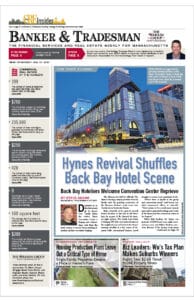Our extensive portfolio of hotel design (and redesign) work has long positioned Arrowstreet’s team of architects and designers at the leading edge of hospitality trends: those elements that can determine which hotels merely survive while others thrive along a landscape of wide-ranging options, from large chains to intimate boutiques.
What’s shaping today’s hospitality evolution? In our work with clients, two themes emerge: the impact of residential trends and the game-changing dynamic introduced by digital disruptors such as Airbnb.
Arrowstreet is often asked by clients to assist them in creating a unique, even singular, hotel experience while at the same time allowing guests to feel as welcome and comfortable as if they were in their own home.
As a result, hotel developers and owners are looking to residential trends and expressing the desire for open, fresh and adaptable space. This means the same hotel lobby which is illuminated by natural light and where business travelers sip the day’s first cup of coffee is still flexible enough to be transformed into a kind of co-working space during the day and a hip, trendy bar in the evening.
It’s worth pointing out that these spaces tend to be sparser and more open as a result of their multi-functionality model. One trend we are also seeing in hospitality space is a partnership between the hotel and a furniture company to merchandise the space, allowing the lobby to double as a virtual showroom.
Health And Wellness: Step Past The Space
As wellness and active lifestyles have become the norm rather than the exception, those traveling for either business or pleasure are no longer willing to sacrifice their daily workout to the road. Today’s expectation of a fitness center in every residential development is being felt in hospitality, where gyms are viewed as less of a luxury amenity but rather an essential – and expected – part of the travel experience.
Food is also a key component of wellness, and so more and more hotels are making it a priority to provide guests with a chef-curated dining experience with locally sourced ingredients. This enables the hotel to feel – and to be viewed – as if it is rooted in the local urban environment.
Operating hotels in 2017 should mean bringing traditional hospitality into the 21st century. Yes, it means more thoughtful programming of spaces, but it also means upgrading services to enhance the guest experience. They say necessity is the mother of all invention, and hospitality – where industry disruptor Airbnb offers an exceptionally personal traveler experience – is no exception.
For instance, our client Magna Hospitality and Hyatt Centric, which is part of developer Related Beal’s master plan for Congress Square, is training staff to be intimately familiar with the surrounding downtown Boston neighborhoods. Being able to offer that increased level of familiarity and authenticity creates a custom, not mass-produced experience and helps elevate one-to-one customer service. No longer is it enough to just have beautiful furniture and unique architecture – the personal touch, like never before, can often be the difference maker.
Working with the Harvard Square Hotel over the past 15 years has allowed Arrowstreet to gain an insider’s perspective on one hotel’s life cycle. We first assisted with the modernization of the hotel in 2002, then again in 2011, we worked with Harvard and Collegiate Hospitality to completely transform the hotel. We reconfigured the entrance and lobby levels, doubling space available to guests to create a sleek, yet comfortable experience.
Seeing the positive change that the most recent renovation has had on guest satisfaction and revenue, Arrowstreet has once again been commissioned to re-imagine the hotel and improve the guest experience. Looking to bring in more of the organic, eclectic feel that’s true to Harvard Square, the result will completely change the look and feel, adapting the guest experience to current trends.
Whether hotels are considering spaces or services, they need to grasp the experiential aspect of travel that today’s visitors crave and expect. They want to learn about their surroundings and so it’s incumbent upon the hotel to provide a unique experience that subtly teaches the guest about the area they are calling home – when they’re away from home, that is.
Davis Bois and Amy Korte are principals at Boston-based architects Arrowstreet.











